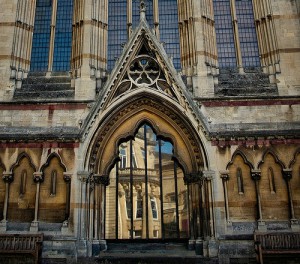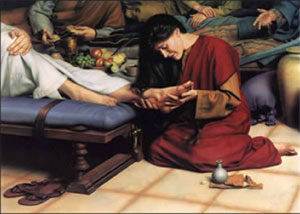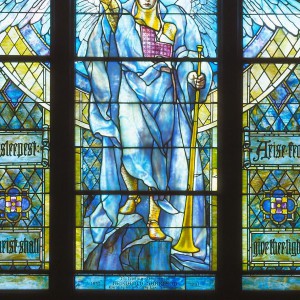42And they devoted themselves to the apostles’ teaching and the fellowship, to the breaking of bread and the prayers. 43And awed came upon every soul, and many wonders and signs were being done through the apostles. 44And all who believed were together and had all things in common. 45And they were selling their possessions and belongings and distributing the proceeds to all, as any had need. 46And day by day, attending the temple together and breaking bread in their homes, they received their food with glad and generous hearts, 47praising God and having favor with all the people. And the Lord added to their number day by day those who were being saved. (Acts 2:42-47)
 The church provokes response from the people. By ‘church,’ I mean those who are trusting in and following Jesus Christ. By ‘the people,’ I mean everyone else.
The church provokes response from the people. By ‘church,’ I mean those who are trusting in and following Jesus Christ. By ‘the people,’ I mean everyone else.
While the church was being the church, devoting themselves to the teaching, the fellowship, the breaking of bread and the prayers; those outside the church looked upon them with favor (grace and kindness). I wish I could tell you that if we continue to grow into the church we can expect such favor from the public, but I cannot. Read Acts and you’ll see the people respond to the church in several different ways.
Fascination and Fear
In Acts 2:5-13 the people respond to the church with bewilderment, amazement and astonishment. In Acts 5, they respond with fear. In both instances they are responding to noticeable power within the church. The Christians speak in languages they’ve never studied and the people are fascinated. Two Christians are stuck dead for lying about their generosity and the people are afraid.
Favor
As we have already seen, in Acts 2:47 the people respond to the church with favor. They saw 3,000 people come to Christ and begin devoting themselves to the teaching, fellowship, breaking of bread and prayers. They observed the Christians’ lives changing as the teaching took effect in their hearts. They noticed them spending a great deal of time together and liquidating their possessions in order to meet each other’s needs. They watched as the class barriers between rich and poor dissolved among them. As they beheld all of this, they liked it. It seemed good to them.
When the people notice power they respond with fascination and fear. When they notice the fellowship, the respond with favor.
Faith or Rejection
As the book of Acts continues the people’s response shifts from fascination, fear and favor to decision. It does not take long for the people to notice that at the core of the church is a man named Jesus who claimed to be the one way, truth and life. Such a claim demands decision. You either believe him or you don’t. Those who believe respond with faith and join the church. Those who do not believe respond with rejection and increasingly violent hostility toward the church.
In Acts 5 the Jewish leadership takes a stand against the church, arresting the apostles. In Acts 6 teachers of other ideologies arise against the church, disputing with Stephen. When they fail in their dispute, they stir up the people with false accusations. In Acts 7 those who reject Jesus grow to hate the church so deeply that they kill one of them. By Acts 8, the persecution grows so hot that the church must scatter for safety. In six chapters the church goes from enjoying favor with all the people to running for their lives.
As the church grows, a wedge drives into the observing public. On one side are those who believe in Jesus, on the other side are those who reject him. As the wedge sinks deeper, the church grows stronger and more hated at the same time.
What this Means for Dulin’s Grove
People should notice power among us and be intrigued. They should notice the quality of our fellowship and appreciate it. However, if we’re being the church, it won’t take long for people to see who is behind this power and fellowship. And when they do, they’ll have to make a decision about the gospel.
The gospel is the spiritual equivalent of shouting “Bomb!” on a plane. There is no middle ground way to respond to this. You either believe it and scramble for safety or you reject it and hate the idiot who keeps yelling “Bomb!”
The Gospel
Christians believe that there is a holy God who created everything, including humanity. He gave the first humans, Adam and Eve, freedom of choice and they chose sin. This choice infected all of humanity with sin, which causes universal death and damnation. But God loved the world so much that he sent his only Son, Jesus Christ to live the life we’ve failed to life and die the death we deserve so that anyone who believes in him and follows him will be saved. This is the one, narrow way. This is what Christians believe. The is the “word of the cross.”
1 Corinthians 1:18 says, “The word of the cross is folly to those who are perishing, but to those who are being saved it is the power of God.” The gospel is idiotic nonsense to a huge segment of the population. Yet to the narrow slice of people who are being saved, it is the very power of God. Folly or power. One or the other.
2 Corinthians 2:15-16 says, “For we are the aroma of Christ to God among those who are being saved and among those who are perishing, to one a fragrance from death to death, to the other a fragrance from life to life.” This one message triggers two very different reactions. Some hear it and it makes them ‘deader.’ Others hear it and it makes them come alive. Death or life. One or the other.
The Most Controversial Aspect of the Church
It isn’t the church’s morality or political stance that splits the world in two. It’s the gospel. If the most controversial thing about the church is our stance on same sex marriage or abortion, we are not being clear enough about the gospel.
The people do not like that we believe marriage can only be the joining of a man and a woman. Nor do they like that we believe abortion is murderous. However, as important as both of these things are, do they not pale in comparison to our belief that all who do not trust and follow Jesus are doomed?
Yes, people will notice God’s power and our fellowship if we’re being the church. But more than that, they will notice the gospel and will respond with either belief of increasingly hostile rejection.
When we are being the church, people will notice. And they will respond.
Discussion Questions
- In your experience, what has been the church’s relationship with the world outside?
- How do you think people outside the church perceive those within the church? Why?
- Read 1 Corinthians 1:18 and 2 Corinthians 2:15-16. How can the gospel be power and life to some, yet folly and death to others? What makes the difference? What does this mean for the church’s relationship with the people outside of the church?
- How can we be the church in such a way that power, fellowship and the gospel are noticeable to the outside world?
- Land on one specific step you will take this week in obedience to this passage and share it with the group.






